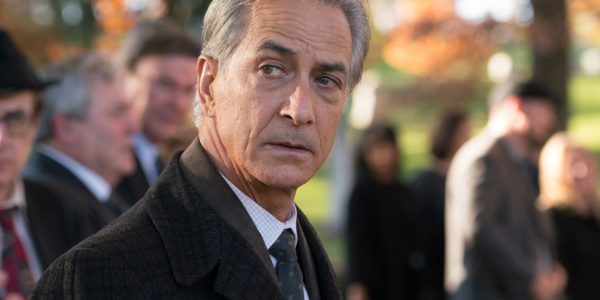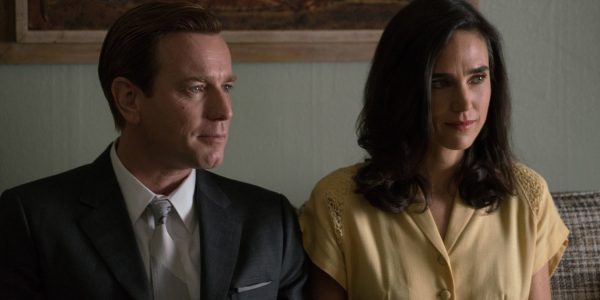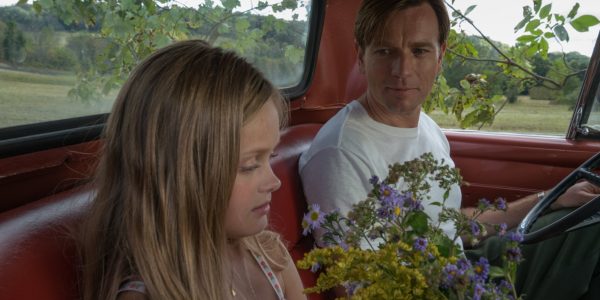American Pastoral Review
"Feature length cliffnotes "
American Pastoral, directed by and starring Ewan McGregor, is a colossal misfire that constantly reaches for something far beyond its grasp.
Based on the Philip Roth novel of the same name, it tells the story of Seymour "Swede" Levov (McGregor), a former high school athlete and successful small town businessman, whose upper-middle-class life is left in shambles due to the growing social and political unrest in 1960s America. Levov's daughter, Merry (Dakota Fanning) becomes increasingly radicalized in her views and disappears right after a bomb is set off in the local post office, killing a man in the process. Unable to cope with the possibility his daughter was responsible, Levov spends many years desperately trying to find her.

You can tell right away that this is an adaptation, and a clumsy one at that, because of the awkward framing device that bookends the film - a former classmate of Levov (David Strathairn) attends a high school reunion and is told the story by Levov's brother (Rupert Evans). It doesn't sit well with the rest of the movie and is characterized by excessive amounts of voice-over narration does nothing but remind you that you're not reading the book.
Those brief scenes also feature some pretty inconsistent old age make-up, as Levov's brother Jerry has several decades worth of almost-convincing-but-not-quite work done on him, while Dawn (Jennifer Connelly), Levov's wife, looks like she hasn't aged a single day.

That, however, is the least of
American Pastoral's problems - first and foremost is the fact that it never seems to know how to move from one scene to another. Every transition is awkward, abrupt and mechanical. There's no sense of time passing and worse still, no sense of character development. The emotional states of all characters are rigid and inflexible - they are whatever the current scene demands them to be. You can logically trace the steps from one moment to another, but there's absolutely no sense of cohesion.
That effectively undermines every single performance in the movie, because none of them are allowed to come together as a whole. Instead, they are a series of well-acted, interconnected dramatic moments that have no sense of flow. One particularly loud and heated emotional outburst from Seymor ends with a random fade to a different scene, which completely deflates the emotional impact the scene was going for.

Nothing is allowed to sink in, there's no sense of build or forward momentum. It's telling when the brief plot synopsis of the book on Wikipedia offers more thematic depth and characterization than the feature length movie adaptation - and that's unfortunate because it's clear McGregor had the best of intentions here.
When all is said and done, the movie is not a disservice to the source material. It doesn't insult, butcher or misrepresent it. Having seen it, I'm actually interested in the book now and could very well read it some day - it just doesn't work as a movie on pretty much every level.
Pros
- Made with the best intentions
- Great attention to detail for set and costume design
Cons
- Emotional register is all over the place
- Clumsily put together
- Doesn't work on almost every level
 You can tell right away that this is an adaptation, and a clumsy one at that, because of the awkward framing device that bookends the film - a former classmate of Levov (David Strathairn) attends a high school reunion and is told the story by Levov's brother (Rupert Evans). It doesn't sit well with the rest of the movie and is characterized by excessive amounts of voice-over narration does nothing but remind you that you're not reading the book.
Those brief scenes also feature some pretty inconsistent old age make-up, as Levov's brother Jerry has several decades worth of almost-convincing-but-not-quite work done on him, while Dawn (Jennifer Connelly), Levov's wife, looks like she hasn't aged a single day.
You can tell right away that this is an adaptation, and a clumsy one at that, because of the awkward framing device that bookends the film - a former classmate of Levov (David Strathairn) attends a high school reunion and is told the story by Levov's brother (Rupert Evans). It doesn't sit well with the rest of the movie and is characterized by excessive amounts of voice-over narration does nothing but remind you that you're not reading the book.
Those brief scenes also feature some pretty inconsistent old age make-up, as Levov's brother Jerry has several decades worth of almost-convincing-but-not-quite work done on him, while Dawn (Jennifer Connelly), Levov's wife, looks like she hasn't aged a single day.  That, however, is the least of American Pastoral's problems - first and foremost is the fact that it never seems to know how to move from one scene to another. Every transition is awkward, abrupt and mechanical. There's no sense of time passing and worse still, no sense of character development. The emotional states of all characters are rigid and inflexible - they are whatever the current scene demands them to be. You can logically trace the steps from one moment to another, but there's absolutely no sense of cohesion.
That effectively undermines every single performance in the movie, because none of them are allowed to come together as a whole. Instead, they are a series of well-acted, interconnected dramatic moments that have no sense of flow. One particularly loud and heated emotional outburst from Seymor ends with a random fade to a different scene, which completely deflates the emotional impact the scene was going for.
That, however, is the least of American Pastoral's problems - first and foremost is the fact that it never seems to know how to move from one scene to another. Every transition is awkward, abrupt and mechanical. There's no sense of time passing and worse still, no sense of character development. The emotional states of all characters are rigid and inflexible - they are whatever the current scene demands them to be. You can logically trace the steps from one moment to another, but there's absolutely no sense of cohesion.
That effectively undermines every single performance in the movie, because none of them are allowed to come together as a whole. Instead, they are a series of well-acted, interconnected dramatic moments that have no sense of flow. One particularly loud and heated emotional outburst from Seymor ends with a random fade to a different scene, which completely deflates the emotional impact the scene was going for.  Nothing is allowed to sink in, there's no sense of build or forward momentum. It's telling when the brief plot synopsis of the book on Wikipedia offers more thematic depth and characterization than the feature length movie adaptation - and that's unfortunate because it's clear McGregor had the best of intentions here.
When all is said and done, the movie is not a disservice to the source material. It doesn't insult, butcher or misrepresent it. Having seen it, I'm actually interested in the book now and could very well read it some day - it just doesn't work as a movie on pretty much every level.
Nothing is allowed to sink in, there's no sense of build or forward momentum. It's telling when the brief plot synopsis of the book on Wikipedia offers more thematic depth and characterization than the feature length movie adaptation - and that's unfortunate because it's clear McGregor had the best of intentions here.
When all is said and done, the movie is not a disservice to the source material. It doesn't insult, butcher or misrepresent it. Having seen it, I'm actually interested in the book now and could very well read it some day - it just doesn't work as a movie on pretty much every level.